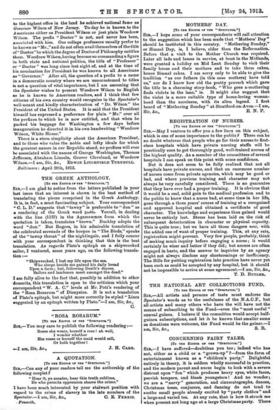THE GREEK ANTHOLOGY. [To THE EDITOR Of TER "SPECTATOR. "]
SIR,—I am glad to notice from the letters published in your last issue that an interest is shown in the best method of translating the pieces comprised in the Greek Anthology. It is, in fact, a most fascinating subject. Your correspondent "0. L. D." suggests that "tawny" is preferable to " dun " as a rendering of the Greek word toaeos. Verrall, in dealing with the line (1137) in the Agamemnon from which the quotation is taken, translates " brown." Buckley adopts the word "dun." But Rogers, in his admirable translation of the celebrated serenade of the hoopoe in " The Birds," speaks of the "tawny throat" of the nightingale, and I fully concur with your correspondent in thinking that this is the beat translation. As regards Plato's epitaph on a shipwrecked sailor, I ventured, some years ago, on the following transla- tion :—
" Shipwrecked, I lost my life upon the sea.
Who sleeps beside me gained his daily bread Upon a farm ; but, following Death's decree,
Sailors and landsmen meet amongst the dead."
I am fully alive to the fact that, possibly in addition to other demerits, this translation is open to the criticism which your correspondent " W. A. C." levels at Mr. Pott's rendering of the "Rosa Rosarum " of Dionysius. It is not a translation of Plato's epitaph, but might more correctly be styled " Lines suggested by an epitaph written by Plato."—I am, Sir, &c., C.










































 Previous page
Previous page